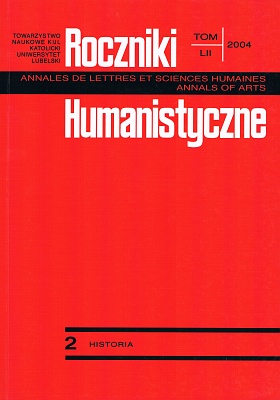Pedagogic and Tutelary Work of Primary Schools in the Tarnów District in the Years 1918-1939
Abstract
In the years 1918-1939 in Polish primary schools pedagogic and tutelary issues played a significant role. They were entered in the schools statutes and constituted part of the didactic process. Following the directions of state education the school aimed at forming in pupils the attitude of respect to work, to national culture and tradition as well as to Christian values. The personal example of the teachers was to play an important role in achieving these aims.
As part of their pedagogical work the schools organized a great number of events and celebrations on the occasions of historic events; the celebrations had both a state and religious character. Besides events that developed patriotic feelings in pupils there were also a lot of other celebrations, connected with the local tradition. In their programs there were often performances presented by the pupils themselves. They enjoyed a great popularity and great audiences came to see them; they were also highly appreciated by the parents. Besides developing patriotic attitudes in the pupils they also evoked artistic feelings in them; another aim was to raise financial means for the school needs and for giving help to poor pupils. Such collections did not always produce desired effects, which was due to the pauperization of the society, especially in the country.
Also sightseeing trips were an important element of the pedagogical process. They had considerable didactic values, which made it easier to follow the curricula. The number of trips, however, depended to a large degree on the parents' financial means.
Organizations that existed in the primary schools also played an important role in forming civic attitudes in the pupils. They were one of the elements of the pedagogic process. A decided majority of them were set up at the beginning of the forties, as the new law about the educational system explicitly stressed state education.
In the schools of the Tarnów District first of all such pupils' organizations were active as Polish Red Cross (PCK), League for the Preservation of Nature (LOPiP), scouting, School Savings Bank (SKO), Marine and Colonial League, Young Men and Women's Association, Eucharistic Crusade, Catholic Youth Association, Legion of the Youth, Rifleman and others. In most schools there were also school shops and active school self-governments.
Day-rooms also played a great role in the area of pedagogical-tutelary work; however, they only existed in town schools. In the country there were no financial resources to open them. The day-rooms operating in town schools to a large degree worked owing to Parents' Committees that supplied the money. They were the places where poor pupils were given food, where dances were organized, and where pupils could get extra lessons.
In the generally difficult economical situation of the district the tutelary role of the school became more important than the pedagogic one. The headmasters and teachers made various efforts in order to help children coming from families whose financial situation was bad. The forms that were most often encountered are: giving food; buying clothes, shoes, school accessories, handbooks; organizing free trips and summer holidays. The money came from local School Councils, Parents' Committees, self-government authorities, the Catholic Church, school shops' income, performances and charity events.
Parents' Committees also played an important role in the pedagogic and tutelary process. Mutual communication between the school and parents gave good results to both parties. However, the parents' participation in the life of the school was not always satisfactory, which resulted not only from their poverty but also from their low consciousness level connecting the role and significance of the school.
References
Gałęcki W., Najważniejsze zagadnienia wychowawcze w dzisiejszej szkole powszechnej, Dz. Urz. KOSK, 1937, nr 7, poz. 94.
Garbowska W., Szkolnictwo powszechne w Polsce w latach 1932-1939, Wrocław 1976.
Gomoła R., Szkoła Podstawowa w Klikowej (1883-1998). Zarys dziejów, Tarnów−Klikowa 1998.
Łabno J., Szkoła Podstawowa im. M. Konopnickiej w Tarnowie 1879-1979, Tarnów 1979.
Pytko S., Z dziejów Szkoły Podstawowej nr 4 im. M. Kopernika w Tarnowie, Tarnów 1984.
Ruta Z., Szkolnictwo powszechne w okręgu szkolnym krakowskim w latach 1918-1939, Wrocław−Warszawa−Kraków−Gdańsk 1980.
Ruta Z., Szkolnictwo średnie i powszechne, w: Tarnów Dzieje miasta i regionu, t. II, red. F. Kiryk, Z. Ruta, Tarnów 1983, s. 550-559.
Spasowski W., Wychowanie społeczne, w: Postępowa myśl oświatowa w Polsce w latach 1918-1939, oprac. B. Ługowski, F. Araszkiewicz, Warszawa 1972.
Sypek A., Szkoła podstawowa im. M. Kopernika w Tarnowie. Zarys monograficzny, „Rocznik Tarnowski”, 1994, s. 105-141.
Śliwiński F., Organizacja szkolnictwa w Polsce współczesnej, Warszawa− Lwów 1932.
Trzebiatowski K., Szkolnictwo powszechne w Polsce w latach 1918-1932, Wrocław 1970.
Winczura Ł., Minął wiek. Z dziejów Szkoły imienia Stanisława Konarskiego w Tarnowie, Tarnów 2000.
Copyright (c) 2004 Roczniki Humanistyczne

This work is licensed under a Creative Commons Attribution-NonCommercial-NoDerivatives 4.0 International License.





